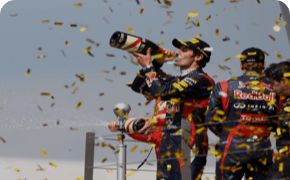Alexander Wurz (AUT) fans Formula One World Championship, Austrian Grand Prix, Rd10, A1 Ring, Austrian, 26 July 1998.
With its picturesque rolling hills, cow-dotted Alpine meadows and soaring mountain peaks, the Styria region of Austria doesn’t immediately strike you as a hub of motorsport. But for over 50 years this particularly green part of the country has been a mecca for Austrian race fans.
In the early days they came to watch local boy Jochen Rindt take on the opposition at the rudimentary, enthusiast-created race track at Zeltweg airfield (venue of the inaugural Austrian Grand Prix in 1964), then to watch Niki Lauda tame the mighty 5.9km Osterreichring (which hosted 18 races between 1970 and 1987), and in more recent times to see Alex Wurz mix it with the cream of the modern crop on the shorter, but no less challenging, Spielberg track (home to the Austrian Grand Prix between 1997 and 2003).
And now, after an 11-year absence, the country that has produced 14 Formula One drivers, three race winners and two world drivers’ champions, is back on the F1 calendar.
“The comeback of F1 means a lot for Austria and the Austrian fans,” explained the country’s most recent Grand Prix winner, Gerhard Berger. “They get the chance to taste motorsport again at its best, and all orchestrated by Red Bull - the masters of cool events!”
As Berger suggests, the revival of the Austrian Grand Prix owes much to Red Bull, the Austrian company whose eponymous team have won the last four drivers and constructors’ crowns. Having undertaken major refurbishments that brought the venue into the modern era, they re-opened the Spielberg track in 2011.
Niki Lauda, Mercedes’ non-executive chairman and the man who became Austria’s second world champion in 1975, is, like Berger, delighted that his homeland is to once again stage a Grand Prix.
“Formula One returning to Austria is simply fantastic,” he said. “I only can say bravo to Red Bull’s bold move to revitalise the track for a Grand Prix. For Austria it’s a fantastic international showcase and it means being back in the highest class of motorsport again. I expect a sizzling weekend and I’m sure that I won’t be disappointed.”
“What immediately springs to my mind when I think of the Austrian Grand Prix? Cows, the land and its people. Alpine feelings spiced with race cars!”
Lauda famously became the only Austrian to win on home soil when he triumphed in the 1984 race, but for Helmut Marko, Red Bull’s motorsport advisor, the race that really stands out is the inaugural event at the Osterreichring in 1970 when home favourite Jochen Rindt was in contention for victory.
“The track was sold out to the very last seat and by the time the race started everything else was sold out too: beer, sausages - everything,” he recalled.
“Rindt started from pole position but had to retire because of an engine failure. What happened with the crowd the moment that he stopped was unforgettable: it sent a shockwave through the grandstands - people left because they couldn’t stand the emotional stress.
“Never before had Austria been so drawn into a sporting event as at that race. I hope we can bring that spirit back this year - and the odds look good: within 36 hours all 180,000 tickets were sold out. So the enthusiasm is still alive!”
Marko isn’t the only person in the paddock who feels sentimental about Formula One racing’s return to Spielberg - before he became involved in F1 circles, Mercedes’ head of motorsport Toto Wolff used to instruct at the circuit’s famous Walter Lechner Racing School.
“I lived on a farm there and every morning I went to the track to give my lectures,” recalled Wolff. “At the time I was dreaming of a big fat racing career. Every time I come close to that place I get very sentimental. I am so happy that F1 is returning to this fantastic track.”
Alex Wurz came fifth in his home race in 1999 and gets similarly misty-eyed when reminiscing about the Spielberg track.
“The old Osterreichring holds many fond memories for me,” he explained. “It was there that I did my first ever laps in a single-seater, where I managed my first win in a Formula Ford car and where I had my first outing in a Formula One car - a Red Bull-backed Sauber. So you could almost say that I am a ‘product’ of that race track.”
The current circuit configuration in Spielberg is nigh on identical to that used in 2003, the last time that F1 racing visited. Whilst it is considerably shorter than the original Osterreichring (4.3km rather than 5.9km), it retains many of the characteristics - the undulations and sweeping corners - that made the famous old track so popular, and for that we can thank Alex Wurz’s father.
“My dad - on behalf of the Styrian provincial government - redesigned the old track that was then to become the A1-Ring, and I did the first layout drawings!” explained Wurz.
“In reality the Red Bull Ring, as it is now called, has still got that old track layout with some modifications. What always made the F1 race stand out was that it was the event with the most overtaking - that’s why we always saw extremely exciting races, both on TV and at the track.”
“I would say it has kept the essence of the old circuit,” agreed Toro Rosso team principal Franz Tost who, like Wolff, also used to instruct at the Walter Lechner Racing School in his early career.
“It has some really difficult corners such as the double left hander (Turns 5 and 6) where you always have a lot of understeer. The other advantage of the new Red Bull Ring is that the spectators can now see the cars for I think 90 percent of the lap, which is really fantastic for the fans.”
Speaking of fans, the huge crowds that have flocked to the circuit over the years have been treated to a host of fantastic races, a few surprise results and the odd controversial moment. Who can forget Vittorio Brambilla crashing just moments after winning the 1975 race, or Elio de Angelis pipping Keke Rosberg to the line in 1982? And no one who was there will ever forget Rubens Barrichello controversially gifting victory to Ferrari team mate Michael Schumacher in 2002.
Unfortunately there won’t be a home favourite for the crowd to cheer in 2014, but could the country’s return to the calendar inspire the next Lauda, Berger or Wurz? Marko certainly hopes so.
“Austria has a long history of great drivers - and there is always the hope that a home Grand Prix will again trigger talents to come forward, even if I have to say that every Austrian who ever made it to F1 was a ‘lone wolf’. We are missing such characters right now in the Austrian talent scene.”
But who knows, perhaps in a few years from now, the locals will have another hero to cheer.
















